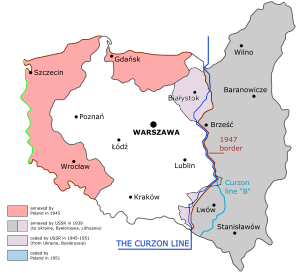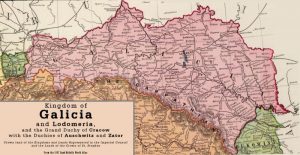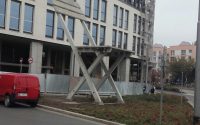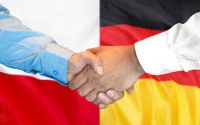Kresy and Galicia
So began my search for any further information about my father’s family. I knew I would have to travel to and research in Poland and Ukraine but firstly, I would have to gain some background knowledge of the locations I would have to target and learn a little about the regions known as Kresy and Galicia, which was the area that my grandmother’s family and her predecessors had lived for centuries after arriving from Armenia. In this blog I will explain briefly a few things about these places, generally unknown to people in Britain.

‘Kresy’ is a term Poles refer to as the borderland that was part of eastern Poland between 1919 and 1939 but was incorporated into the USSR in 1945 and is now spread over three independent countries: Ukraine, Belarus and Lithuania. Three major cities Lviv (Lwów) Brest (Brześć nad Bugiem) and Vilnius (Wilno) now located in each of those three countries respectively were of strategic importance in the defence of the eastern border. The area was, historically always a homeland to Ruthenians, Poles, Belarussians, Lithuanians, Germans, Armenians, Ashkenazi Jews and a sprinkling of Tatars, Lemko-Rusyns and Hutsuls with apologies to anyone I’ve missed out. Ukraine is a term which means borderlands (from the old Slavic ‘ukrainia which is a collective term for borderlands, marshes or places ‘on the edge’). The region is regarded by many Poles as the cradle of Polish culture as many musicians and writers were born there such as Adam Mickiewicz, Czesław Miłosz and Juliusz Słowacki. The region had historically been invaded by Russians, Ottoman Turks and Cossacks, but for the greater part of history it was exclusively Polish – Lithuanian. As part of the infamous Molotov – Ribbentrop pact of 1939, (https://en.wikipedia.org/wiki/Molotov%E2%80%93Ribbentrop_Pact )which saw Poland partitioned by Adolf Hitler’s Nazi Germany and Josef Stalin’s USSR, the majority of the Poles of Kresy, my grandmother and aunt included, were deported to labour camps in Siberia on Stalin’s orders. They were never to return to Kresy and those who did remain were sent to western Poland to the territories which had for centuries belonged to Germany. The Poles of Kresy never completely settled in the new territories and had romantic notions of once more returning there. Today entry to Ukraine is easy and foreign visitors are free to move about and so cities like Lviv (Lwów in Polish) are host to thousands of visitors from Poland, much in the same way as Germans are regular visitors to Wrocław in Poland (Breslau in German). The majority of Poles and Germans seem satisfied with that. Be warned, the rise of nationalism across Europe has the potential to ruin this arrangement of free movement.

‘Galicia’ is an area spread over southern Poland to south western Ukraine. Historically, it was referred to as the Kingdom of Galicia and Lodomeria. It had roughly the same mix of nationalities as Galicia overlapped with Kresy. As for the whole of central and eastern Europe It has the usual complex and violent history. It almost seems as if the area never really recovered from the Mongol invasions, beginning with Genghis Khan. Massacres, the plague alll contributed to the decimation of the population, being filled later with other incoming nationalities whichnin turn led to uprisings, wars and foreign invasions. The earliest records around the beginning of the 13th century mention the Kingdom of Galicia-Volhynia, later becoming the homeland of the Ruthenians (a people now scattered betrween Poland, Ukraine, Slovakia, Romania and Hungary) and then being incorporated into the Kingdom of Poland which then united with the Grand Duchy of Lithuania to form a mighty Commonwealth and the region grew to include Kraków. Following the partitions of Poland in the late 18th century, it became the kingdom of Galicia and Lodomeria, a crown land of the Austro-Hungarian Empire and remained as such until Poland regained its independence after the end of WW1. During WW1 it saw many battles fought between the Russian Empire on one side and the German and Austro-Hungarian on the other. Many Galicians formed the army of the Austro-Hungarian Empire, my grandmother’s own family among them. Incidentally my grandfather fought in the same army, for reasons I will explain in a later blog and confirmed by a Ukrainian genealogist I would meet in Lviv. In the opinion of some historians Galicia was allowed to decline by the Austrians, as they saw it as worthless for industrial development and of agricultural use only. Whatever the reason my grandmother’s own family prospered as landowners. Today the region straddles Poland and Ukraine, each claiming to be the original Galicians, which is ironic as both countries were originally populated by numerous ethnic groups.
And so out of these turbulent crazy territories, I received my own genes. Is it any wonder I felt different from the other kids in school?
End


